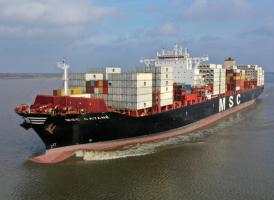
MSC Gayane – Photo: HHM / Dietmar Hasenpusch
Yesterday, US Customs seized the 9,962 TEU container ship MSC Gayane. The MSC Gayane was the ship on which 18,000 kilograms of cocaine, worth an estimated $1.3 billion, was seized by Federal agents while at the dock in the Port of Philadelphia in late June. From the US Customs press release:
“The MSC Gayane is the largest vessel seized in U.S. Customs and Border Protection’s 230-year history and follows the record seizure of almost 20-tons of cocaine discovered on the vessel,” said Casey Durst, CBP’s Director of Field Operations in Baltimore. “Seizing a vessel of this size is an unusual enforcement action for CBP, but is indicative of the serious consequences associated with an alleged conspiracy by crewmembers and others to smuggle a record load of dangerous drugs through the United States. This action serves as a reminder for all shipping lines and vessel masters of their responsibilities under U.S. and international law to implement and enforce stringent security measures to prevent smuggling attempts such as this.”
“A seizure of a vessel this massive is complicated and unprecedented – but it is appropriate because the circumstances here are also unprecedented. We found nearly 20 tons of cocaine hidden on this ship,” said U.S. Attorney McSwain. “When a vessel brings such an outrageous amount of deadly drugs into Philadelphia waters, my Office and our agency partners will pursue the most severe consequences possible against all involved parties in order to protect our district – and our country.”
Continue reading →
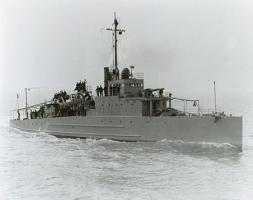 On April 23rd, 1945, the patrol boat USS Eagle 56 was towing targets for US Navy bomber exercises off the coast of Maine. At about noon, there was an explosion around amidships which broke the patrol boat in half. Of the crew of 62, only 13 survived. The sinking was originally blamed on a boiler explosion. It would take the Navy until 2001 to conclude that Eagle 56 had been sunk by the German submarine U-853. USS Eagle 56 was the last US warship sunk by a German submarine in World War II.
On April 23rd, 1945, the patrol boat USS Eagle 56 was towing targets for US Navy bomber exercises off the coast of Maine. At about noon, there was an explosion around amidships which broke the patrol boat in half. Of the crew of 62, only 13 survived. The sinking was originally blamed on a boiler explosion. It would take the Navy until 2001 to conclude that Eagle 56 had been sunk by the German submarine U-853. USS Eagle 56 was the last US warship sunk by a German submarine in World War II.
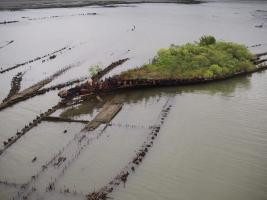
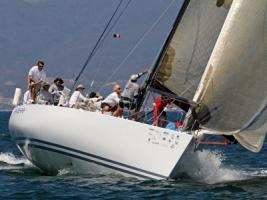

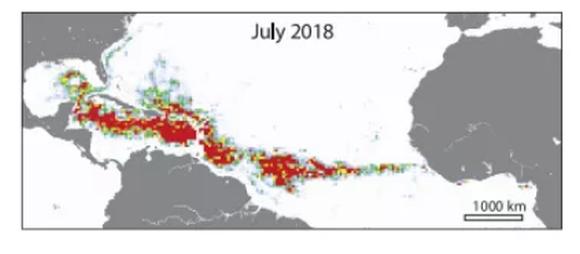 Floating mats of
Floating mats of  If you are near New York harbor on Saturday, July 13th, stop by the South Street Seaport, Piers 16 and 17, from 10AM to 4PM, to help celebrate
If you are near New York harbor on Saturday, July 13th, stop by the South Street Seaport, Piers 16 and 17, from 10AM to 4PM, to help celebrate 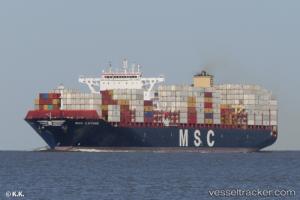 Recently, we posted about the MSC Gayane, the container ship seized on Monday by US Customs following a $1.3 billion cocaine bust last month in Philadelphia. We said that the ship was not owned by Mediterranean Shipping Company (MSC) but by a shipping fund controlled by JP Morgan. We based this on a Fairplay article from October reporting the sale of the ship from SinOceanic.
Recently, we posted about the MSC Gayane, the container ship seized on Monday by US Customs following a $1.3 billion cocaine bust last month in Philadelphia. We said that the ship was not owned by Mediterranean Shipping Company (MSC) but by a shipping fund controlled by JP Morgan. We based this on a Fairplay article from October reporting the sale of the ship from SinOceanic. On July 5, in a very close race, the schooner
On July 5, in a very close race, the schooner 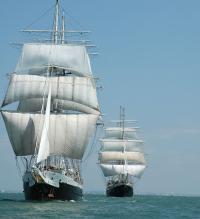 The financial crisis that threatened to shut down the
The financial crisis that threatened to shut down the 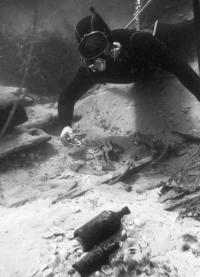 The yeast from a
The yeast from a 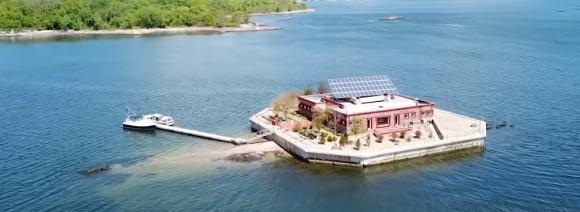 Looking for a private island getaway within a reasonable commuting distance of New York City?
Looking for a private island getaway within a reasonable commuting distance of New York City? 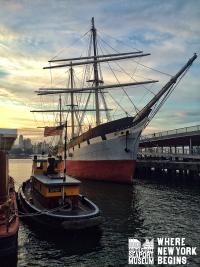 If you are around New York harbor on Sunday, there is a wonderful opportunity to hear and join in singing sea chanteys as they were meant to be sung, onboard a windjammer. The chantey sing will aboard the restored 1885 built flagship of the seaport,
If you are around New York harbor on Sunday, there is a wonderful opportunity to hear and join in singing sea chanteys as they were meant to be sung, onboard a windjammer. The chantey sing will aboard the restored 1885 built flagship of the seaport,  Happy 4th of July to all. Here is lightly updated repost appropriate for the day.
Happy 4th of July to all. Here is lightly updated repost appropriate for the day. On July 2,
On July 2, 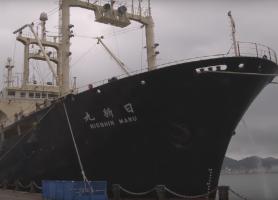 Japan has withdrawn from the International Whaling Commission, and the Japanese whaling fleet has abandoned their so-called “research whaling” to resume
Japan has withdrawn from the International Whaling Commission, and the Japanese whaling fleet has abandoned their so-called “research whaling” to resume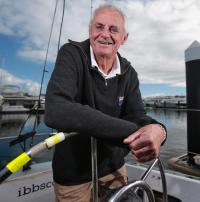 After completing his
After completing his